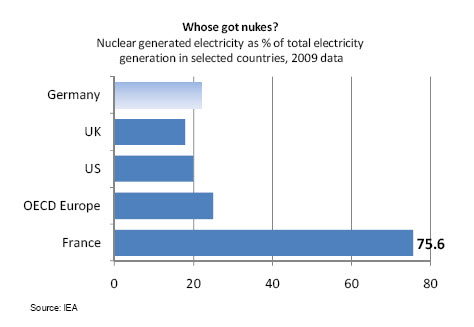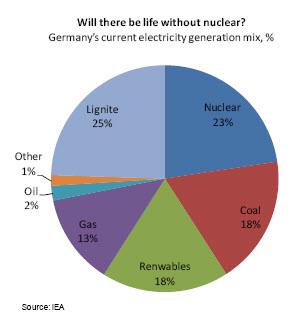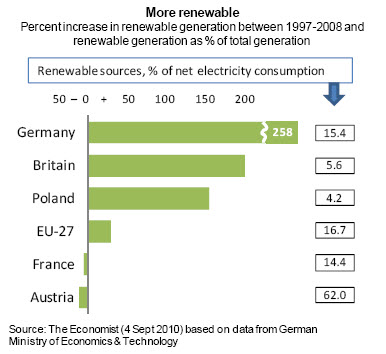This is a sample article from the October 2010 issue of EEnergy Informer.
A compromise gives the industry until 2036 to hang on to the existing fleet, with strings attached
Under a plan approved by a center-left government under different circumstances in 2000, Germany’s 17 perfectly safe nuclear plants were to be shut down by 2022. This despite the fact that in the US, France and the UK, the industry has been encouraged to extend the life of the existing units to 60 years or so since it has proven difficult to build any new ones.
The 3 powerful German nuclear operators, RWE, EON, EnBW and Swedish Vattenfall lobbied hard to reverse the politically-based decision, pointing out, with justification, that the country would have a difficult time meeting its ambitious greenhouse gas emission targets without the nuclear option. Germany currently gets roughly 23% of its electricity from nuclear energy, among the highest in Europe with the exception of France (see accompanying chart) and few smaller
economies.

Chancellor Angela Merkel, a physicist by training, has been publicly supportive of the industry’s pleas but bound by the politics of her center-right coalition government. The industry wanted a 20-year extension – not unusual by international standards – but the opposition wanted to shut them down by 2022 as originally planned. In the end, Mrs. Merkel decided on a compromise after a marathon 10-hour negotiation session. It calls for 7 reactors built before 1980 to get 8 extra years while the newer ones will be allowed 14. The last plant will be shut down by 2036 instead of 2022.
As compromises go, nobody was happy with the outcome, each side feeling bitter that it did not get what it wanted, but both sides agreed that it was the best that could be achieved given the circumstances.
Johannes Teyssen, the outspoken CEO of EON, the biggest German utility, said he welcomed the compromise “in principle,” but complained that the 12-year average extension window was “too short a period” to allow intermittent renewables to effectively fill the gaping hole left by nuclear’s reliable based-load generation. He has a point.

Trying his best to sound conciliatory, Mr. Teyssen said, “With this decision, the German government has made it clear that nuclear energy will continue to be needed for some time as one of the main pillars of our energy policy,” adding that, “The concrete implications still needed to be examined for each (affected EON) plant.
Moreover, as had been expected, the industry is to pay some €30 billion (approx. $39 billion) in “extra profits” resulting from the extension of the existing plants to government to be used to support renewables and for investment in infrastructure.
Mrs. Merkel was able to sell the compromise to environmentalists and greens on the basis that the nuclear extension would provide the needed bridge and the extra time to make the transition to a greener and cleaner energy mix in the future. Merkel, a former environment minister, called the compromise a “reasonable technical solution.” She said that the renewable sector was not capable of filling the energy gap left if nuclear plants were shut down by the original deadline.
Germany is intent on increasing the share of renewable energy resources from the current 16% to 30% by 2020 while cutting down greenhouse gas emissions 40% from 1990 levels by the same deadline — twice the EU’s current target. In 40 years, Germany wants to get 80% of its electricity from renewables — a mind-boggling target for a large industrial economy.

The Environment Minister, Norbert Rottgen, cleverly focusing on the positive aspects of the compromise, boasted that the €30 Billion windfall tax will allow Germany to reach 80% renewable target in 40 years, something that “does not exist and is without parallel” in any other industrialized country.
Still, the greens and the anti-nuclear lobby were disappointed at the outcome. Some 56% of Germans want the nuclear phase-out to proceed as originally planned, only 38% favor an extension, according to a recent poll. Possible legal challenges and/or a potential future reversal cannot be ruled out, but for now, the nuclear operators have a few more years to run the existing nuclear fleet.

